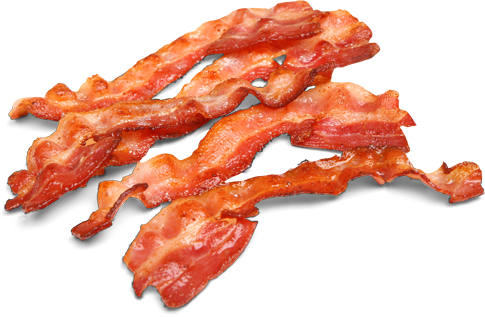The Cancer Research
Compounds in processed meat tied to cancer are produced from smoking, curing, and nitrate- or nitrite-based additives. Evidence shows that even small amounts of processed meat eaten regularly increase the risk of colorectal cancer. Processed meats pose a greater risk of colorectal cancer than red meat that is unprocessed.
Common examples of processed meats include bacon, sausage, hot dogs, pepperoni, ham, corned beef, and cold cuts like bologna and salami. If you include these meats frequently with your breakfast, sandwiches, or barbecues, explore other delicious options that you can swap to replace them most of the time.
Although chicken or turkey versions of these meats may be healthier in some ways, it is best to minimize all forms of processed meat.
There is strong evidence that consuming Processed Meat (Sausages, Ham, Bacon, Hot Dogs, Salami) INCREASES the risk of:
- Colorectal Cancer
Interpreting the data
After a systematic review of the global scientific literature, AICR/WCRF analyzed how foods and their nutrients affect the risk of developing cancer.
“Convincing” or “probable” evidence means there is strong research showing a causal relationship to cancer—either decreasing or increasing the risk. The research must include quality human studies that meet specific criteria and biological explanations for the findings.
A convincing or probable judgement is strong enough to justify recommendations.
· There is convincing evidence that processed meat (Sausages, Ham, Bacon, Hot Dogs, Salami) INCREASES the risk of:
- Colorectal cancer
“Limited suggestive” evidence means results are generally consistent in overall conclusions, but it’s rarely strong enough to justify recommendations to reduce risk of cancer.
- Limited evidence suggests that processed meat may INCREASE the risk of:
- Lung, pancreatic, stomach (non-cardia type), esophageal (squamous cell type) and nasopharyngeal cancers.
Ongoing Areas of Investigation
- Research Update
Laboratory studies show that when meat is smoked, cured, salted or has added nitrites, compounds form that can cause cancer. Smoked meat contains compounds called PAHs (polycyclic aromatic hydrocarbons). Nitrites used to preserve meat can combine with a component of meat protein, creating certain nitroso-compounds during the curing process as well as within the digestive tract. In animal studies, nitroso-compounds cause several types of cancer.
If the processed meat is made of red meat — beef, pork or lamb – the heme iron and other compounds they contain also add to cancer risk.
Human studies show that an increase in the amount of processed meat eaten links to an increase in the risk of colorectal cancer.
- When analyzing the global evidence, AICR/WCRF found limited evidence suggesting that processed meats are associated with greater risk of cancers of the stomach, nasopharynx, esophagus, lung and pancreas.
- Some studies have also linked processed meat with greater risk of breast or prostate cancer. However there are inconsistencies in the evidence, and the AICR/WCRF analysis of overall research categorized the evidence as too limited for any conclusion.
Featured Studies
From the Blog
References
- World Cancer Research Fund / American Institute for Cancer Research. Continuous Update Project Expert Report 2018. Diet, nutrition, physical activity and colorectal cancer. Available at: dietandcancerreport.org.
- IARC Working Group. Volume 114: Consumption of red meat and processed meat. IARC Monographs on the Evaluation of Carcinogenic Risks to Humans. Lyon; 6–13 September, 2015.: International Agency for Research on Cancer,.
- World Health Organization. Q&A on the carcinogenicity of the consumption of red meat and processed meat. October 2015; http://www.who.int/features/qa/cancer-red-meat/en/
https://www.iarc.fr/en/media-centre/iarcnews/pdf/Monographs-Q&A_Vol114.pdf. Accessed January 2020.
- Hammerling U, Bergman Laurila J, Grafström R, Ilbäck N-G. Consumption of Red/Processed Meat and Colorectal Carcinoma: Possible Mechanisms Underlying the Significant Association. Crit Rev Food Sci Nutr. 2016;56(4):614-634.
- World Cancer Research Fund/American Institute of Cancer Research. Continuous Update Project Expert Report 2018. Meat, fish and dairy products and the risk of cancer. Available at: dietandcancerreport.org.
- Turesky RJ. Mechanistic Evidence for Red Meat and Processed Meat Intake and Cancer Risk: A Follow-up on the International Agency for Research on Cancer Evaluation of 2015. CHIMIA International Journal for Chemistry. 2018;72(10):718-724.
- Fonseca-Nunes A, Jakszyn P, Agudo A. Iron and Cancer Risk—A Systematic Review and Meta-analysis of the Epidemiological Evidence. Cancer Epidemiology Biomarkers & Prevention. 2014;23(1):12-31.
- Wu J, Zeng R, Huang J, et al. Dietary Protein Sources and Incidence of Breast Cancer: A Dose-Response Meta-Analysis of Prospective Studies. Nutrients. 2016;8(11):730.
- Wu K, Spiegelman D, Hou T, et al. Associations between unprocessed red and processed meat, poultry, seafood and egg intake and the risk of prostate cancer: A pooled analysis of 15 prospective cohort studies. International Journal of Cancer. 2016;138(10):2368-2382.
- World Cancer Research Fund / American Institute for Cancer Research. Continuous Update Project Expert Report 2018. Diet, nutrition, physical activity and breast cancer. Available at: dietandcancerreport.org.
- World Cancer Research Fund / American Institute for Cancer Research. Continuous Update Project Expert Report 2018. Diet, nutrition, physical activity and prostate cancer. Available at: dietandcancerreport.org.






